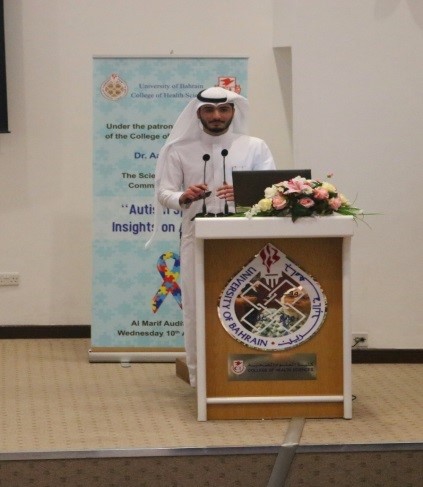The College of Health Sciences acts as an integral part of the society. Members of the UOB realize the importance and the role of the health sector in engaging with all segments of society. Moreover, we acknowledge the role of the healthcare system in addressing the needs of people for various available levels of care, assistance and attention. Based on the role of the college as being the first destination for training health care professionals, the partnered with the scientific and health communities to take a pioneering stand in solidarity in the month of April with all patients suffering from autism. The increase in autistic cases directs the College towards its rightful duty in raising awareness of this disease and introducing the importance of mental, psychological and social health. As a result, as an initiative from the CHS to increase the public’s awareness, an event was held at the college about the types and causes of autism and the treatment options.
Many pioneers and specialists participated in this field, where they presented the latest studies related to this disorder, and how to deal with people with autism from a specialized scientific health perspective. Dr. Ahmed Hazem, a psychiatrist consultant at the Matana Health Center, gave a lecture on the most important and recent studies on autism, and he indicated the importance of relying on guaranteed treatments, which include results instead of using ineffective treatments that make the guardian incur financial expenses without benefit. He also indicated that each case has a specific way of dealing with it, and the therapist must understand the situation from all its causes and take into account the diseases accompanying autism. He indicated that although most therapists have experience in dealing with autistic children in childhood, only a few focus on their development in adolescence, which it considers to be one of the best treatment stages.
The importance of nutrition for autistic children was also highlighted through a lecture given by nutritionist Hanaa Ali Saeed from Al-Kindi Specialized Hospital where the focus was on many nutritional therapies used in autism cases to alleviate some of the symptoms such as casein-free diet and gluten. Some advice was also given on how to use color preferences to urge the autistic child to eat foods and to introduce some foods that are not preferred for the child. The nutritionist Hanaa Ali also expressed that people with autism usually suffer from a disorder in the digestive system, which may cause them symptoms that they cannot verbally express, so they tend to either reject foods, prefer mashed foods, or express them by hitting the pharynx or making aggressive movements that reflect their unease or Their mother.
The importance of occupational therapy in autism spectrum disorder is not hidden. Occupational therapy specialist Akram bin Jamal from the Kayan Center for Special Education participated in the newest methods used to develop mental and physical perception and the place surrounding an autistic child through sensory and motor training.
Dr. Sawsan Karimi, associate professor at the Faculty of Arts, also shared her experience with a kidney for an autistic child. As she took her presence on her journey over the years and faced Latif Autism when her son was diagnosed with him at the age of three. The doctor has mentioned her passing through several emotional stages during her journey, starting with denial and anger to the stage of acceptance and living the most beautiful moments with her child who successfully completed his high school studies and began his university studies. The attendees enjoyed the talks presented in the event and praised the scientific content. They supported the college in arranging and conducting similar events to benefit the community.





